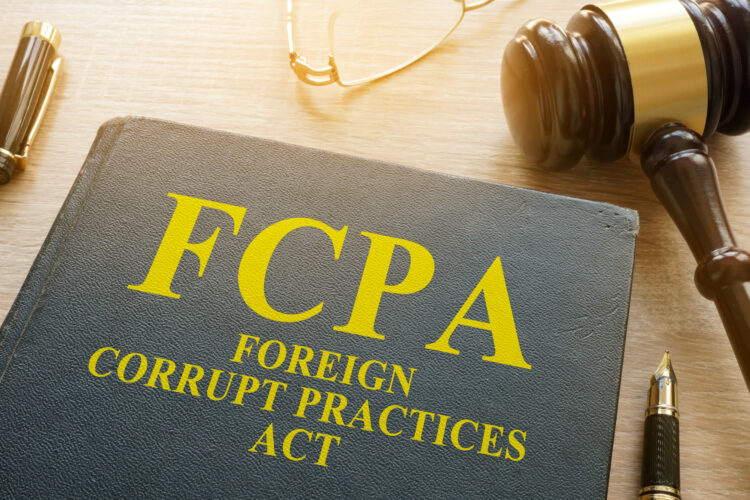January 18, 2024
The Foreign Corrupt Practices Act (FCPA) is an anti-corruption law enacted in 1977, but has had a more of a significant impact on individuals and businesses in the 21st century as the federal government has devoted more resources to policing corruption involving government officials not just in the United States but around the world as well.
Although many companies – particularly large corporations – have educated their employees and managers about the restrictions and consequences of the FCPA, many companies and individuals still operate in ignorance of the FCPA and the harsh penalties that can be imposed on those who violate it. While many people think that making certain payments to officials and/or go-betweens is simply the way business is done in other parts of the world, such actions can result in significant criminal and civil penalties even where the activity takes place many thousands of miles away from the United States.
There are two main sections of the FCPA – accounting standards and anti-bribery provisions – and this article will focus on the latter.
What do the Anti-Bribery Provisions of the FCPA Prohibit?
For American companies and individuals (which can include directors, officers, employees such as salespersons, and agents of companies), the FCPA prohibits the offer, payment, promise to pay, or authorization of the payment of any money, or offer, gift, promise to give, or authorization of the giving of anything of value to any foreign official, foreign political party, or candidate for foreign office for the purpose of any of the following:
- Influencing any act or decision of such foreign official in his official capacity
- Inducing such foreign official to do or omit to do any act in violation of the lawful duty of such official
- Securing any improper advantage
- Inducing such foreign official to use his influence with a foreign government to affect or influence any act or decision of such government in order to assist with obtaining or retaining business.
The FCPA further prohibits such payments, offers, or gifts to “any person, while knowing that all or a portion of such money or thing of value will be offered, given, or promised, directly or indirectly, to any foreign official…” Thus, paying an intermediary such as a “facilitation payment” to a private agent for an improper benefit from a foreign official may violate the FCPA as well.
There is an exception under the FCPA where the above provisions will not apply to “any facilitating or expediting payment to a foreign official, political party, or party official where the purpose of the payment is to expedite or secure the performance of a routine governmental action by the payee.
The FCPA also provides several affirmative defenses for such payments, offers, gifts, or promises, such that there will not be a violation of the FCPA anti-bribery provisions where the following facts apply:
- The payment, gift, offer, or promise of anything of value that was made was lawful under written laws and regulations of the receiver’s country, or
- The payment, gift, offer, or promise of anything of value that was made was for a reasonable and bona fide expenditure of the receiptions such as travel and lodging expenses, and was directly related to the promotion, demonstration, or explanation of products or services, or the execution or performance of a contract with foreign government or agency.
Note that foreign issuers of securities in the US and their agents face similar anti-bribery provisions.
Essentially, the FCPA incorporates broad language to prohibit and deter bribes – whether in the form of payments, gifts, or other benefits – to foreign officials or their agents in exchange for those officials providing an improper benefit in return, for example securing a contract with the government or obtaining a license or other permit to do business. Although many countries have a reputation for such payments being commonplace, the purpose of the FCPA is to level the playing field and deter foreign corruption by prohibiting such conduct even where it takes place far from the United States.
Consequences of Violating the Foreign Corrupt Practices Act
American businesses and individuals who are found to violate the anti-bribery provisions of the FCPA face a number of significant consequences, including the following:
- Businesses face a fine of up to $2,000,000
- Businesses and individuals face civil penalties of up to $10,000 for each violation
- Any individual may be fined up to $100,000
- Any individual may be imprisoned for up to five years, in addition to facing the $100,000 fine, and $10,000 civil penalty per violation
FCPA investigations by the federal government also can impose a large cost on both individuals and businesses who are suspected of violating the FCPA, in addition to the cost of defending FCPA prosecutions pursued by the federal government. Additionally, when made public, investigations and prosecutions of businesses relating to alleged FCPA violations can result in significant reputational damage for companies and individuals alike.
Speak with an Experienced White Collar Crimes Lawyer
The time to seek experienced counsel from a skilled white collar defense attorney is at the first signs of a potential government investigation, enforcement action or prosecution. Often, the first steps in responding to a potential government proceeding are the most critical in setting the course for an ultimate outcome that defends one’s interests, reputation, and, in some cases, freedom. Contact our office to speak with an experienced white collar defense attorney regarding your situation today.

